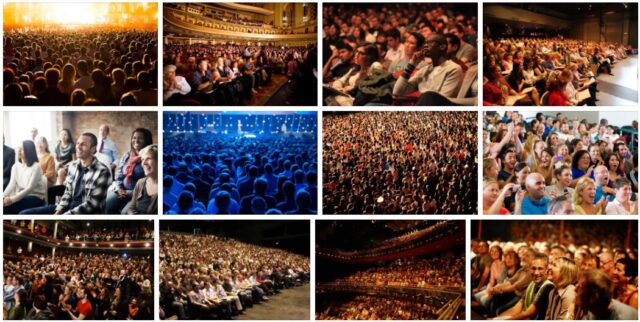The word audientia came to Castilian as audience, a concept that has several meanings. The idea of audience can refer to the spectators of a play, a concert or other event; to viewers; or to the listeners of a radio program.
For example: “Channel 17’s newscast continues to lose audience from month to month”, “As soon as the singer got on stage, the audience gave him a standing ovation”, “We want to apologize to the audience since, due to technical problems, no we will be able to broadcast the game live ”.
While the terms audience and audience may function synonymously when talking about people performing in a theatrical performance, the former is often used with respect to a particular group of people, such as those who have attended a play in a theater. defined date, while the second can be used to refer to the all followers of an artist. For example: “Last night I did not notice a very strong connection between the singer and the audience”, “This singer has a deep connection with her audience “.
At a general level, we speak of audience with reference to the group formed by all the recipients of a message transmitted through a mass communication medium. The measurement of the audience, reflected in an index known as rating, is very important in the commercial sphere: companies pay to advertise their products in the programs with the highest ratings. Therefore, knowing the audience data is essential for the media that must find advertisers to solve their operation.
This concept has undergone great changes in the last decade, as a consequence of those that the world of entertainment and the entertainment industry have experienced since the arrival of the Internet in our lives. While in the early 90’s a large percentage of people watched television for several hours a day, this source of entertainment has been left in the shadows because of the innumerable possibilities that current technology offers us.
At that time, to measure the audience of a television channel, various methods were used that today are obsolete and unnecessarily complicated, since the digitization of the media allows companies to collect data related to the number of reproductions of each program, the geographic regions in which the views and user profiles have been made, which may include their age, gender, occupation and even their personal tastes.
On the other hand, in an almost contradictory way with such advances, the loyalty that the public showed a few decades ago to their favorite shows and artists seems to have been diluted in pursuit of cold and temporary relationships with the content recommended by others, with the trends. If maintaining the audience levels of a program was already difficult in the past, today it has become a real odyssey, and for that reason long series are not common.
A hearing is also the act that is carried out so that one or more people can present their position on a certain issue before the authorities: “Tomorrow I will have a hearing with the mayor and I will request his support to solve the case of my murder. son ”, “ Due to scheduling problems, the president will not attend the hearing with the victims of the fire: the vice president will attend instead ”, “ If you have any concerns, I suggest you ask my secretary for an audience ”.
Finally, in the field of law, the hearing is a process that takes place before a court or a public entity for the resolution of a conflict or for the provision of evidence or testimony in the context of a litigation.
